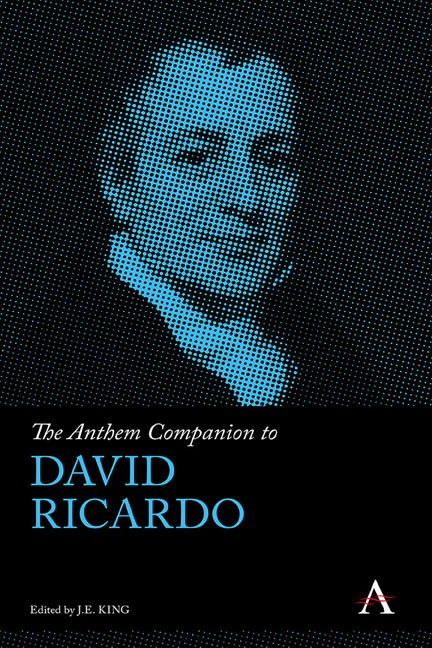Book contents
- Frontmatter
- Contents
- Notes on Contributors
- Chapter 1 Introduction
- Chapter 2 On Some Myths about Ricardo’s Theory of Money
- Chapter 3 Ricardo on Foreign Trade
- Chapter 4 ‘A Tolerably Correct Law Respecting Proportions’: Ricardo on Income Distribution
- Chapter 5 Ricardo on Economic Policy
- Chapter 6 (Mis)Interpreting Ricardo
- Chapter 7 Ricardo’s Business Activities
- Chapter 8 Political Economy ‘Through a Glass Hive’? The Encounter of Ricardian Ideas with Nineteenth-Century Australia
- Chapter 9 Ricardo and Classical Political Economy
- Chapter 10 Ricardo and Marx
- Chapter 11 Malthus and Ricardo on the Dismal Science
- Further Reading
- Index
Chapter 6 - (Mis)Interpreting Ricardo
Published online by Cambridge University Press: 17 October 2023
- Frontmatter
- Contents
- Notes on Contributors
- Chapter 1 Introduction
- Chapter 2 On Some Myths about Ricardo’s Theory of Money
- Chapter 3 Ricardo on Foreign Trade
- Chapter 4 ‘A Tolerably Correct Law Respecting Proportions’: Ricardo on Income Distribution
- Chapter 5 Ricardo on Economic Policy
- Chapter 6 (Mis)Interpreting Ricardo
- Chapter 7 Ricardo’s Business Activities
- Chapter 8 Political Economy ‘Through a Glass Hive’? The Encounter of Ricardian Ideas with Nineteenth-Century Australia
- Chapter 9 Ricardo and Classical Political Economy
- Chapter 10 Ricardo and Marx
- Chapter 11 Malthus and Ricardo on the Dismal Science
- Further Reading
- Index
Summary
Introduction
Major interpreters of David Ricardo assess his contribution to political economy in vastly different terms. Karl Marx praises Ricardo's ‘scientific impartiality and love of truth’ (Marx 1954, p. 412) and the ‘honesty which so essentially distinguishes him from the vulgar economists’ (Marx 1959, p. 555; original emphasis). William Stanley Jevons is one in a row of critics who contended that the doctrine of the classical authors and especially Ricardo ‘is radically fallacious; it involves the attempt to determine two unknown quantities from one equation’ (Jevons [1871] 1965, p. 258; see also 258–59): profits and the level of output, given the real wage rate. Léon Walras reiterates the criticism: ‘In the language of mathematics one equation cannot be used to determine two unknowns’ (Walras [1874–77] 1954, §368), while Joseph A. Schumpeter stokes it up: according to him Ricardo's ‘fundamental problem’ was that he ‘wanted to solve in terms of an equation between four variables: net output equals rent plus profits plus wages’ (Schumpeter 1954, p. 569). Schumpeter also accuses Ricardo of ‘piling a heavy load of practical conclusions upon a tenuous groundwork’ (1954, p. 1171). The ‘Ricardian vice’ is said to consist in drawing bold policy conclusions from oversimplified and arbitrarily closed models of the economy. Knut Wicksell instead defends Ricardo against this kind of criticism: ‘the way in which Ricardo develops his argument […] is a model of strictly logical reasoning about a subject which seems, at first glance, to admit of so little precision’. And: ‘Ricardo's theory of value is, one finds, developed with a high degree of consistency and strictness’ (Wicksell [1893] 1954, pp. 34 and 40). He adds
Since, according to Ricardo, wages represent a magnitude fixed from the beginning, and since – as he later shows – the level of rent is also determined by independent causes, the cause of capital profit is already settled. It is neither possible nor necessary to explain capital profit in other ways, if the other assumptions are sound. (ibid., pp. 36–37)
Interestingly, a few years earlier Alfred Marshall dubs Ricardo the head of the ‘brilliant school of deductive reasoning’ (Marshall 1890, p. 629), and explains: ‘His strong constructive originality is the mark of the highest genius in all nations. […] Ricardo's power of threading his way without slip through intricate paths to new and unexpected results has never been surpassed’ (ibid, p. 629, n. 1).
- Type
- Chapter
- Information
- The Anthem Companion to David Ricardo , pp. 91 - 124Publisher: Anthem PressPrint publication year: 2023



